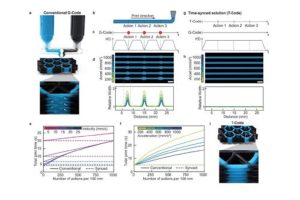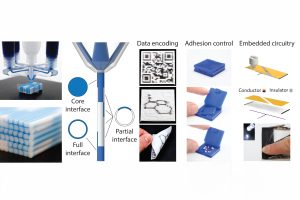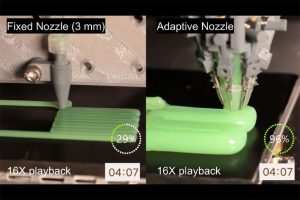Jochen Mueller, an assistant professor in the Department of Civil and Systems Engineering, performs research that combines additive manufacturing, functional materials, and computational design in order to create programmable matter.
Mueller’s research lives at the intersection of science, application and design. With interests in 3D printing and manufacturing, architected, programmable, and smart materials, and computational design, his Laboratory for Digital Fabrication and Programmable Materials combines the fabrication processes with computational tools to create or manipulate existing materials and structures in order to change their properties and improve their performance. Mueller’s hands-on background in the aerospace and automotive industries allows him to pursue research projects that have real-world applications, improving materials used in everything from prosthetic devices to lightweight structures.
Within Johns Hopkins, he is an associate researcher at the Institute for NanoBioTechnology, a fellow of the Hopkins Extreme Materials Institute, and is a member of the Johns Hopkins Center for Additive Manufacturing and Architected Materials. He also holds secondary appointments in the Department of Mechanical Engineering and the Department of Materials Science and Engineering.
In 2020, he received the Lopez-Loreta Prize to conduct research on how to improve the materials used in prosthetic devices. Previous projects of his include the creation of a process to precisely control the fiber-alignment in composite materials, the fabrication of lightweight structures that overcome the mutual exclusivity between strength and toughness, the design of smart textiles that autonomously adapt to changes in the environment, building active lattices that can seamlessly switch from hard to soft, and the manufacturing of soft, walking robots that achieve record-breaking speeds. His name is currently on eight patents and his research has been featured in publications such as Advanced Materials, Proceedings of the National Academy of Sciences (PNAS), and Nature, and media outlets including The Boston Globe and MIT Technology Review.
Holding a doctorate from ETH Zurich, a master’s in Advanced Mechanical Engineering from Imperial College London, and a bachelor’s in Mechanical Engineering from Albstadt‐Sigmaringen University, Mueller recently completed a postdoctoral fellowship at Harvard University in the Wyss Institute for Biologically Inspired Engineering. He received the ETH Medal in 2018 for his doctoral dissertation.
He is a member of the American Society of Mechanical Engineers (ASME), the Association of German Engineers (VDI), and the Materials Research Society (MRS). He also reviews papers for numerous journals, among them Science, Nature, and PNAS.



